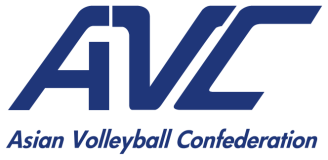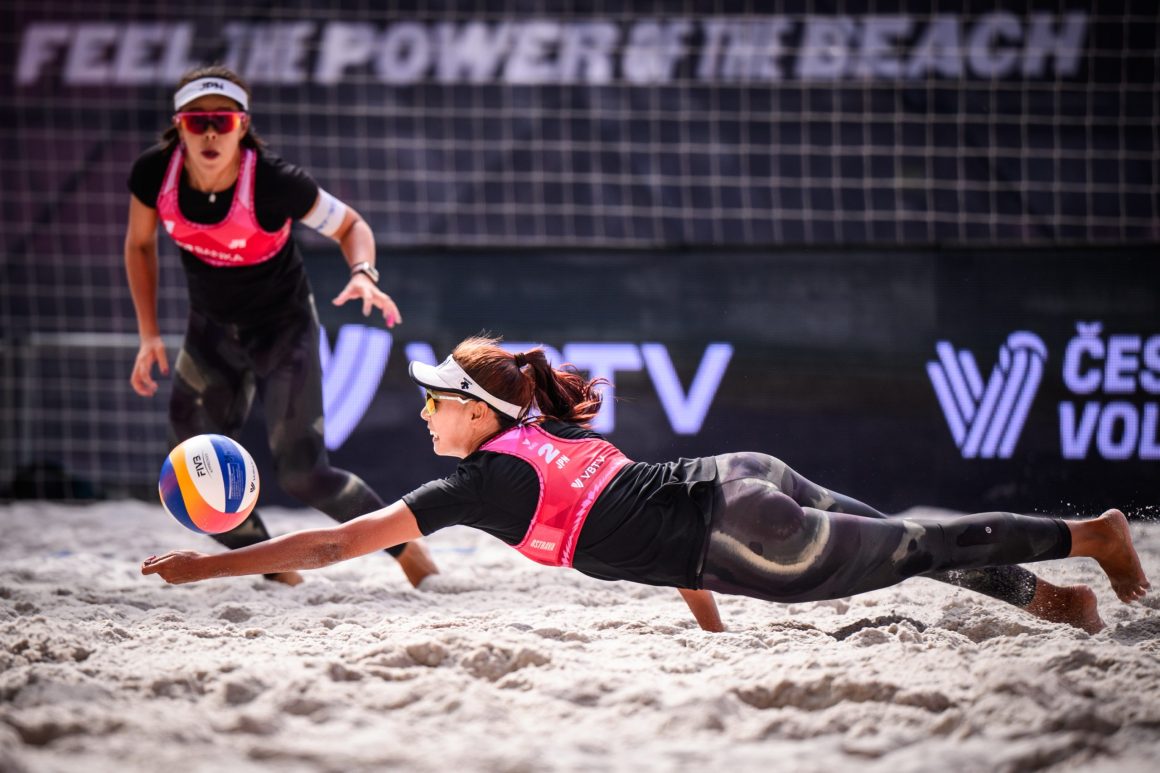Culture, character and communication in coaching drive Japan’s competitive progress
Before receiving Empowerment support, Japan’s beach volleyball programme was broad but decentralised, as teams trained independently with their own coaches and often in different locations. While there was no shortage of talent or experience, the national programme needed a shared direction that could coordinate planning and maintain consistent participation in international competitions.
In 2023, the Japan Volleyball Association (JVA) received $84,000 in application-based coaching support through the FIVB Volleyball Empowerment programme, which supported the appointment of veteran coach Steve Anderson, who guided Australia’s women’s team to Olympic gold in beach volleyball at Sydney 2000, as head coach and project manager of the national programme.
“Japan has a long history of volleyball success, technical expertise and innovation,” Anderson said. “But in beach volleyball, there was a lack of international coaching experience. Volleyball and beach volleyball are different disciplines, and many techniques and strategies don’t directly transfer.”
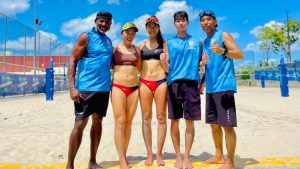
Steve Anderson with Japanese women’s beach volleyball athletes and coaches during training, strengthening team cohesion under the Empowerment programme. (Source: Japan Volleyball Association)
Rather than apply an imported style, Anderson worked with Japanese coaches and athletes to create a shared model built around local strengths. Together, they developed the JVA Style of Play, a national framework grounded in collaboration and cultural understanding.
“Our head coach is developing a JVA Style of Play as a foundation to be taught to all of our national team coaches and athletes. It incorporates the knowledge and nuances that highlight the specific characteristics, personal knowledge and history that only Japanese beach volleyball coaches and athletes can know,” Anderson explained.
Daily training is now centralised at the Beach Volleyball National Training Centre in Kawasaki, with players and staff operating under a consistent system. The approach also includes interpreters, assistant coaches, analysts and administrative staff, all working under an organised framework.
According to JVA Beach Volleyball Group Senior Director Chikashi Kawai Anderson’s strength has been his ability to adapt his coaching style to the Japanese team environment and communicate in a way that resonates with local athletes and staff.
“Steve has made an effort to understand Japanese culture, communicates in a way that suits the Japanese character, and is very attentive,” Kawai said. “In the past, several foreign coaches have joined the Japanese national team, but most of them left after a short period. However, Steve’s coaching method is calm, patient, and tailored to the situation, so it is expected that his training plan will gradually take root over time.”
The JVA also implemented new internal processes. Teams are now required to submit training schedules and follow a coordinated calendar. National team selection is based on transparent criteria, with shared expectations across all athletes.
“By clarifying the conditions for selection as a candidate for the Japanese national team and ensuring transparency, the awareness of each team has improved.”
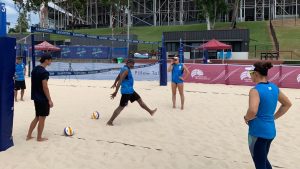
Coach Steve Anderson leads a training session with Japan’s national beach volleyball teams during their overseas camp in Brisbane. (Source: Japan Volleyball Association)
To strengthen international competitiveness, Anderson pushed for more overseas experience. He encouraged teams to plan off-season training camps abroad and accompanied them to foster cohesion. The JVA raised its travel support, enabling each team to attend up to eight international tournaments per year.
“Immediately after taking Steve’s position, he recommended overseas training camps during the off-season to each team, had them come up with plans, and accompanied them on their overseas training camps to discuss with each team and foster a sense of unity as Team Japan,” Kawai said.
“We prioritised establishing Steve’s new system and increasing the number of overseas trips subsidised by the NF, thereby increasing each team’s opportunities to participate in international tournaments and raising their international competitiveness.”
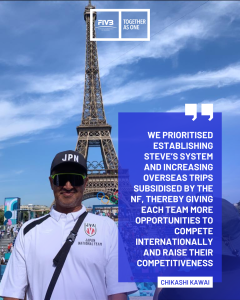
Recent results have reflected that increased exposure. Asami Shiba & Reika Murakami placed as high as fourth on the Asian Tour and currently ranked third in the AVC qualification standings for the World Championship. Miki Ishii & Saki Maruyama reached the podium in Asia, and Ren & Non Matsumoto earned top finishes at Beach Pro Tour Futures events.
While the women’s programme has made strides, the men’s side has faced challenges. At the 2023 Asian Games, Japan’s men’s quota was reduced from two teams to one. Previous Olympic cycles also saw limited progress. This contrast has added urgency to the effort to build a cohesive system that supports athletes across both programmes.
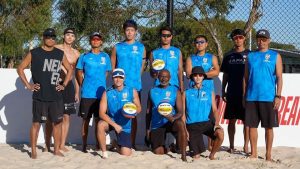
Japan’s men’s beach volleyball athletes and coaching staff pose during their overseas training camp, part of the national effort to strengthen international competitiveness. (Source: Japan Volleyball Association)
The changes have also shaped how coaches plan and collaborate. Yoshi Atsumi, who coaches Shiba & Murakami, said the national planning model has influenced his own approach.
“In terms of planning, I have come to realise the importance of team planning by conducting larger-scale planning as a representative team rather than as individual teams,” Atsumi said. “I feel that this programme has had a positive effect in terms of reaffirming my coaching style.”
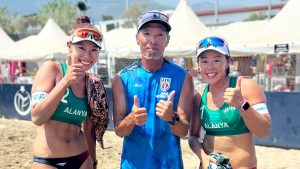
Coach Yoshi Atsumi with Reika Murakami and Asami Shiba at the Beach Pro Tour Challenge Alanya. (Source: Japan Volleyball Association)
For the athletes, this shift has brought new tools and greater clarity. Murakami said Anderson’s neutral role helped her accept a fresh perspective on her game.
“Since Steve is not a coach for any team, I find it easy to accept his objective advice, and I think it has helped me grow by giving me new ideas for my play.”
Shiba said the presence of Anderson at international events deepened her sense of responsibility and allowed her to grow beyond her long-term coaching relationship.
“I have been working with my current coach (Yoshi Atsumi) for over seven years, but this support has broadened my perspective by receiving advice from a third-party perspective,” Shiba said.
“Additionally, while I have always had a sense of responsibility as a representative of Japan, the increased opportunities for Steve to accompany us to competitions alongside our regular coach have made me feel even more accountable as part of the national team. As a result, I have become more positive in my outlook and gained greater confidence. As a team, I believe we are making steady progress gradually.”
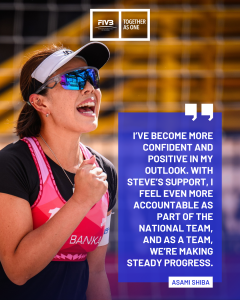
JVA has outlined competitive targets from 2025 until LA28 Olympic Games. These include medal finishes at FIVB and AVC events, qualification for both editions of the World Championships, and a direct Olympic berth.
“We have re-structured our national team programmes to include important beach volleyball community stakeholders in our talent identification and development process,” Anderson said. “We are formalising our coach education and mentoring processes to share JVA national team systems, philosophy, and Japan’s winning style of play.”
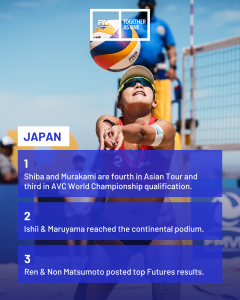
He described the project not as a quick turnaround, but as the foundation for something lasting.
“The Volleyball Empowerment programme provides critical financial support to fund my head coach and project manager position. This enables me to share my knowledge and experience with the national team members and the wider Japan beach volleyball community,” Anderson stated.
Anderson described the project as more than just a sporting initiative, highlighting its broader potential to impact both individuals and society.
“I foresee continued growth and success on and off of the court, where athletes and coaches develop as people as well as professionals. I also foresee beach volleyball being a vehicle for societal impact – modelling human excellence for Japan’s wider population,” he concluded.
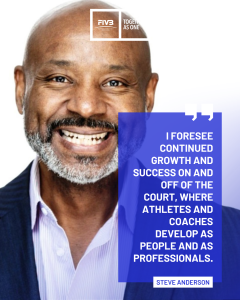
QUICK LINKS
AVC Website: click www.asianvolleyball.net
AVC Facebook: click https://www.facebook.com/avcasianvolleyball
AVC Twitter: click: www.twitter.com/AsianVolleyball
AVC Instagram: click: https://www.instagram.com/avcvolley/?hl=en
Mikasa Instagram: click: https://www.instagram.com/mikasasports_official
AVC Youtube: click: Asian Volleyball Confederation
AVC WeChat: Asian Volleyball Confederation
